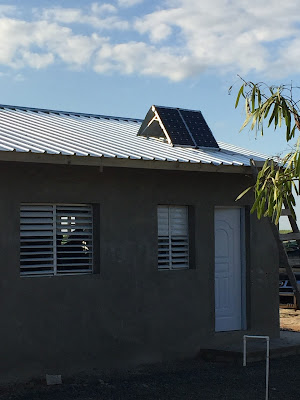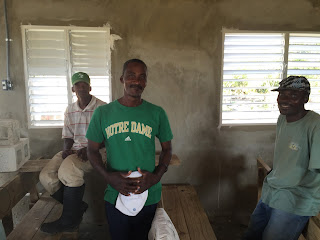The Shepherd’s Scrawl
February, 2016
I have just returned from an eleven day missions trip to the Dominican
Republic
Some remarkable things stand out to me as I think back over my time in
the Dominican Republic. The first lesson learned happened more than a week
before my trip began. Kelly (my wife, in case you, reader, don’t know me well)
and I went to New York immediately after our church’s Christmas Eve service to
spend Christmas with our three sons Derrin, Ryan, and Matthew, our
daughter-in-law Katrina, our daughter-in-law-elect Liz, and our son Ryan’s
girlfriend Kristin, and our grandboys Eli and Will. Eli gave me a very special
Christmas gift that he made himself: a nasty cold, complete with ear infection
that took away most of the hearing in my right ear.
I realized that I would leave the United States in a physically
weakened condition—not how I would choose to begin my first-ever missions trip!
Still, God reminded me of His reassuring words to the Apostle Paul, as
recounted to us in 2 Corinthians 12:9-10 (NIV)—“But he [the Lord] said to me, ‘My
grace is sufficient for you, for my power is made perfect in weakness.’ Therefore
I will boast all the more gladly about my weaknesses, so that Christ’s power
may rest on me. That is why, for Christ’s sake, I delight in weaknesses, in
insults, in hardships, in persecutions, in difficulties. For when I am weak,
then I am strong.”
It was helpful that part of our team included doctors, nurses, and a
pharmacist. Once we arrived at our destination, one of the doctors looked in my
ear and declared that the infection had cleared up. As a precaution, he
prescribed an additional 7 days of antibiotics, which our pharmacist was able
to provide. This professional opinion reinforced my confidence that I would
most likely survive the 11 days out of country, and I was able to set aside any
concerns about my health, though my impaired hearing continued to be a source
of annoyance. Even so, the reminder that I was going on this trip NOT in my own
strength and ability, but in the power of God’s Spirit, did and does fill me
with confidence and hope that God can, will, and does accomplish His good
purpose and will FOR me, IN me, TO me, and THROUGH me.
While in the Dominican Republic, I was given three major
responsibilities:
General
construction laborer: having worked in construction and carpentry about
three decades ago, I claimed to be qualified for (a) demolition—my specialty, and
(b) unskilled but willing labor. I declared myself available and willing to do
anything I was asked or instructed to do, to the best of my ability and without
grumbling or complaining. I ended up spending 5 of the 6 working days on
finishing a roof over a large concrete cistern. In this case, a block-shaped
structure approximately 12 feet high, 22 feet wide and 18 feet long. The
rafters were already in place when we arrived. Our team secured the rafters to
the concrete walls with “hurricane straps” bolted into the concrete and secured
to the wooden rafters. We then added 1x4” wooden strips to fasten the corrugated
steel roofing. Finally, we secured the metal roofing itself. Sounds simple,
right? It took 4 ½ days to complete, due to (a) unskilled labor and (b) daily
trips to buy (or scrounge) additional materials. Along the way, we added “fancy”
doors (plywood sheets with hinges and coiled spring closers) to replace the
simple sheets covering the openings to the outside toilets for the new church
at the Molinito batey. As a break, I got to operate heavy equipment one day. In
this case, the heavy equipment was a shovel and wheelbarrow—equipment I am
qualified to operate. We moved a large pile of dirt, and then a larger pile of
crushed stone, to finish off the garden in front of the church building, where
previously the rains would leave the garden a sea of mud.
 |
| Preparing the cistern roof for the corrugated metal roofing |
 |
| The "Fancy" doors on the Privy |
 |
| Roofing nearly complete; we needed just two more sheets of metal roof to finish! |
 |
| Finished with mismatched scrap piece of roofing... not pretty but serviceable |
 |
| Moving dirt... |
 |
| ...and crushed stone (gravel)... |
 |
| ...to finish the front garden of the church. |
Before I leave this topic, I want to mention that it was during our final day of construction on Saturday that we witnessed a MIRACLE, which I am calling "The Miracle at Molinito". You can read more about that HERE.
2 Preaching
and teaching: Pastor Steve Straubel and I were called on to preach in 5 of
the 6 church services held during the time we were there. Additionally, we were
asked to give testimonies and teach the Bible at the Saturday night Youth
Meeting each of the two Saturdays we were there. Finally, I presented a
workshop to the leaders of the church there on the second Sunday afternoon. It
was an interesting experience to preach or teach through an interpreter.
Professional tip: it takes twice as long to speak when everything is spoken
twice!
 |
| Dennis with Pastor Tanis interpreting |
 |
| Dennis with Fortune Brevil interpreting at the youth meeting |
I was assigned to lead a nightly “wrap-up” session with the various members of our
team. Our team was made up of 30 different people, the majority of whom were a
medical team of doctors, nurses, a pharmacist, and some assistants who
conducted medical clinics in different communities each day. In addition to
this and a few of us doing various construction and maintenance work, we also
had some who taught Art classes in the school, two artists who worked on
specific artwork for the church, two young women who volunteered to work in the
school for 6 months, teaching English and helping in the youngest classes, and
a photographer/videographer. With so many different people working in different
places and doing different things, it was helpful and encouraging to give
people an opportunity to talk about what they had done, who they had met, and
how they experienced being an instrument in God’s hands.
 |
| The entire team, with Pastor Tanis and Esther Derolus at the far left |
The most important lesson I learned on this trip was not a NEW lesson,
but definitely a NEW emphasis. When it comes right down to it, it did not matter
what task I was given, whether I built anything, or taught anything, or saw
anything. God’s work is not about building buildings, establishing organizations,
or staying busy doing things. God’s focus is, and always has been, on PEOPLE.
ALL people everywhere, and EVERY person, EACH person, uniquely and
individually. Whether the people I encountered on this trip were familiar to me
(only one person I interacted with on this trip is someone I have known for at
least one year, and nobody that I knew just 18 months ago) or whether I just
met them for the first time; whether they live in Maine, or Pennsylvania, or
Georgia, Virginia, New York, Michigan or Florida; whether their native language
is English, Spanish, or Haitian Creole; no matter their education or profession
or age or economic status. Each person is a unique creation of God and the
object of His determined affection.
One day as I was working—it happened to be the shovel & wheelbarrow
day, since my body was fully engaged in the work but my mind was free to work
on other things—I began translating in my head the words of the chorus I
learned to sing as a child: “Jesus loves the little children, all the children
of the world; red and yellow, black and white, they are precious in His sight; Jesus
loves the little children of the world.” My translation into Spanish was
flawed, of course. One of our translators helped me to get it right. But the
idea behind this simple song is true. It has always been true. And it will
continue to be true, for God is not going anywhere, and He is not going to
change His views.
When I left Las Colinas, San Pedro de Macoris, and the Dominican Republic
behind, I was already thinking about and planning for my NEXT trip. The new
friends I met and relationships begun need to be nurtured now. A “strategic
ministry partnership” has been established, but it will need to be developed,
maintained, enhanced. This was not, I hope and believe, a “one and done, bless
and run” experience.
A word of thanks to all my family and friends who prayed for me,
supported me financially with your donations and gifts, and encouraged me along
the way. You have made a difference IN my life, and I am truly grateful.
Dennis Ashley, the Scrawling (and, for a little while, Wandering) Shepherd













